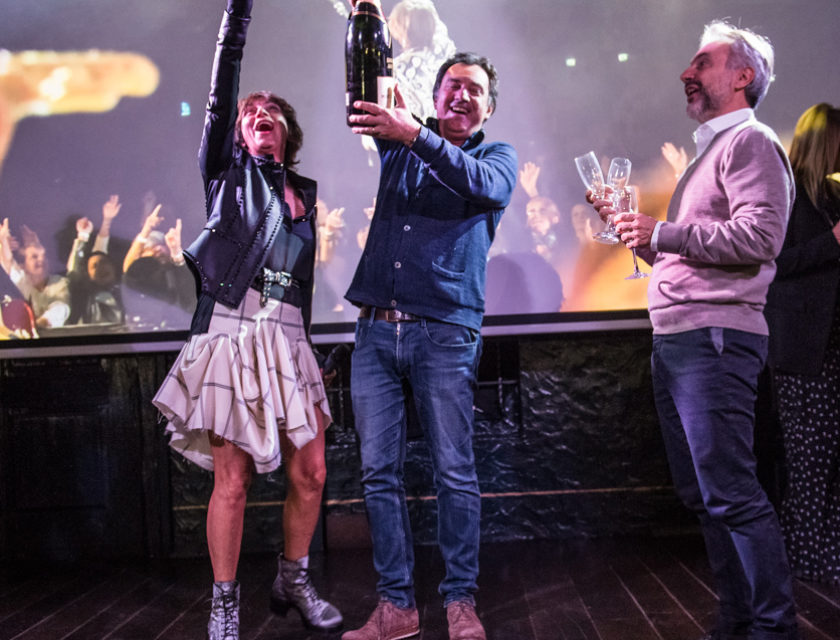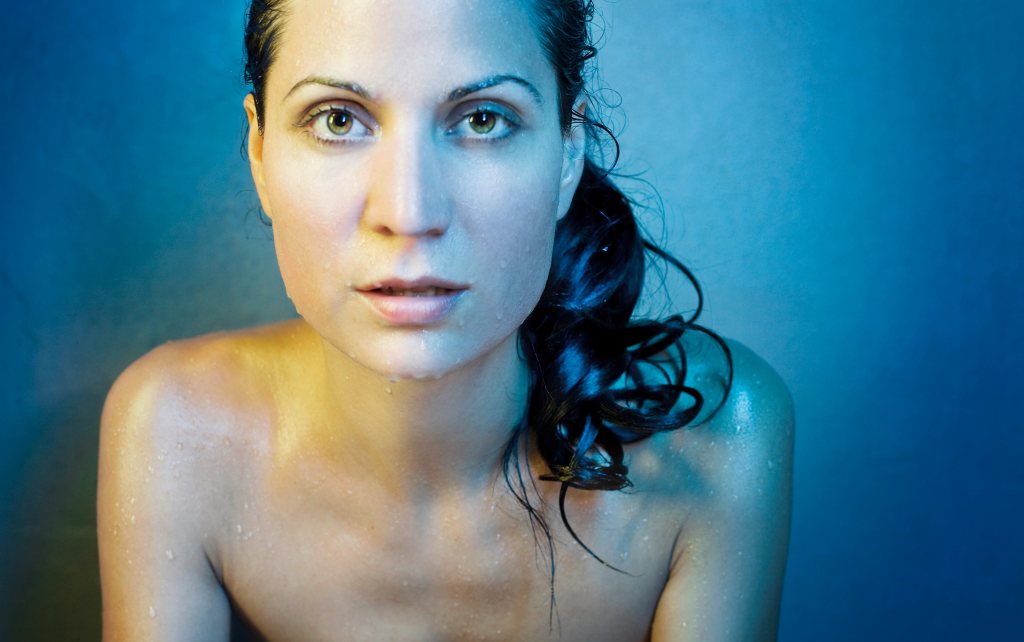Abbiamo intervistato Zoe Leela, artista tedesca che sta esplodendo in Europa grazie a grinta e determinazione. Il suono album d’esordio Digital Guilt è un mix di stili musicali fusi perfettamente grazie alle nuove opportunità della musica elettronica.
-Chi era Zoe Leela prima di essere la cantante Zoe Leela?
Ho sempre cercato di esprimere ciò che ho dentro. Ho sempre amato esibirmi sul palco e colpire il pubblico con la mia personalità. Quando ero piccola, sognavo di fare l’attrice e, per questo motivo, a diciotto anni mi sono trasferita a Berlino. Qui ho frequentato una scuola di recitazione e, un giorno, per caso, sono inciampata nel canto. E lì ho capito che il canto è la madre di tutte le azioni. È più personale, cantare mi permette di lasciarmi andare, di vivere il momento, di essere spontanea. Amo la musica e, confesso, non ho mai avuto paura di fallire. Per me, essere capace di lavorare oggi con la musica è fantastico!
-Quando è cominciata la tua carriera?
Nell’estate del 2009 ho incontrato TOMPIGS. Ci siamo innamorati, io delle sue foto, lui della mia musica, entrambi del rispettivo modo di esprimerci. Abbiamo deciso di iniziare a collaborare e a supportarci per raggiungere ciò che volevamo senza permettere a nulla di fermarci, avanti a testa bassa…insomma, non vogliamo mica uccidere nessuno, sono solo musica e immagini! Nel 2010 ho realizzato il mio EP di debutto QUEENDOM COME, realizzato su Cologne’s Rec72.net, una etichetta discografica online. Solo nel primo mese, era già stato scaricato 34.000 volte! Così sono stata notata e nel 2012 con MOTOR Entertainment e ROUGH TRADE ho realizzato il mio primo album DIGITAL GUILT.
-Questo nuovo album è molto elaborato: dal titolo ai suoni. Partiamo dal significato di Digital Guilt. Qual è la colpa dell’era digitale?
L’era digitale sta cambiando radicalmente il modo in cui l’industria culturale opera. Ci sono problemi nella gestione del copyright e l’intero sistema ha bisogno di evolvere per creare nuovamente benefici per autori e fans. Ma sembra che cercare un riconoscimento, costruirsi dei valori, sia vergognoso oggi! Infidi uomini, astuti leader dalle menti vuote stanno cercando di riempire la nostra mente con numeri, display, statistiche, stanno cercando di imprigionarci nel loro mondo senza scopo. Ci rubano il portafoglio mentre non guardiamo. Vogliono farci paura cosicché la nostra lunga vita sia spesa al loro servizio. Se potessero, ci ridurrebbero a vegetali che lavorano per loro.
-A proposito del singolo Puppets, uno dei nostri preferiti, un brano electro pop con reminiscenze classiche che non disdegna nemmeno la dubstep! Come è nata questa canzone?
Noah Felk, influenzato dal frammentato ambiente beats inglese, ha creato la traccia e me l’ha inviata. Ascoltandola, si è creata nella mia mente l’immagine di una serie di fantocci che mi hanno eccitata e spronata a cantare per far sentire che io, invece, sono viva “Something sacred to be born/ Passing through her like a ghost thet keeps on haunting/Shining through her twofold”. Sai, ci sono spesso persone che ti trascinano nella merda, ma ci sono anche persone, per fortuna, che ti invitano a condividere con loro i più bei sogni: “The clarity of dreams are warm and real/ Lying naked, blue seas breaking/ There’s nothing we can’t be.”
-Nelle tue canzoni sei capace di prendere il meglio dell’era digitale e mixarlo con vari stili musicali. Parlaci di questi esperimenti musicali.
C’è una vasta gamma di stili musicali che ispira le mie creazioni, ma per me la musica serve a catturare il momento, mi impegno al 100% nelle mie canzoni. L’unica cosa che mi interessa è l’onestà che irrompe con intensità da ciò che creo. La mia musica non è un genere di musica, non ha bisogno di definizioni.
Sul palco con me c’era la mia band. Se non suonassi live, se per esprimermi fossi costretta ad usare un cd di sottofondo preregistrato, se non potessi assicurare un gran spettacolo, non sarei niente. Un cantante non è nulla senza il live e lo show dice la verità su chi è l’artista.
-Cosa pensi del futuro della musica?
Credo che la prossima tappa sarà una musica creata da persone che prima pensano e poi agiscono e non da dirigenti interessati solo ai soldi. Io ammiro ogni artista, e non conta se il suo lavoro è pagato o no. E la cosa migliore dell’era digitale, è proprio che ci sarà sempre più la possibilità di fare arte senza dover chiedere il permesso a nessuno. Puoi scrivere una canzone e puoi registrarla esattamente come la vuoi, stando a casa tua. Non hai bisogno di firmare un contratto, non devi dividere i tuoi compensi ne chiedere il permesso per esprimerti. Finché ci saranno artisti, questo è il miglior momento di sempre per creare musica, musica come arte non come prodotto.
-Speak about Zoe Leela before become Zoe Leela.
Who was me? I have always tried to bring the inside outside. I’ve always loved to go onstage and knock myself out. It’s often been more about intensity than hitting all the notes. Ever since I was a little girl, I’ve dreamed of acting. That’s why I came to Berlin when I was 18. During acting school, I kind a fell into singing. Singing really is acting. I love music, and being able to work on that is amazing.
-How was you career start?
In Summer 2009 I stumbled into TOMPIGS. One can say we fell in love with each others expression, his photography, my music. Later that year I released my Debut EP QUEENDOM COME. Two years later, with the help of MOTOR Entertainment, functioning as a service provider, and ROUGH TRADE, as the distributor, I released my debut album, DIGITAL GUILT. For me it has always been important to make my music available to the public for certain uses, like non-commercial sharing and remixing. So I am happy to contribute my music to fans for non-commercial use and still sell limited rights of use to both local – and well established brands all over the world to spread and share my music.
-Your new album DIGITAL GUILT is so elaborate. Why do you speak about guilty?
The digital age has fundamently altered the way the content indusry operates and traditional models of copyright management need to evolve to benefit authors and music fans alike. These tiny masters, hollow men out there are trying to blow your mind with numbers, with blood displays and statistics, trying to pull you into their useless world of censorship and restrictions. With their wall of sound they pick your pockets when you are not looking. They seek to intimidate you into a lifelong career of submission. If they can, they will reduce you to an example of fearful human garbage.
Glory, built on selfish principles, is shame and guilt!
-We’d like to speak about Puppets. We can listen electro pop with classic reminiscences that don’t disdain dubstep. How this song was born?
Influenced by the land of broken, fragmented beats (UK), Noah Felk produced the track and sent it to me. Listening to the instrumental, the image of puppets came to my mind. It reminded me of how singing is a way of making myself exist. There is always people who willl pull you in the shit river and drown you. But there is also people who invite you into their dreams and trust you.
-In your songs you are able to extract the best from our digital age and mix it with a lot of musical style. Do you think a name for your works exist yet? Or is it a new sound experiment?
There is a huge variety of sounds and styles that inspire me. But for me music is about capturing the moment. Songs that are 100% committed. The kind of emotional intensity that is honest and crushing is all that matters to me. My music doesn’t need a definition.
-Some technique questions. How do you create your plug in and sounds?
On DIGITAL GUILT we used the Micro Korg a lot, a very nice machine for sound design and noise. The drums are original samples of the classic drum machines like 808, sp12, mpc and so on. Drums go through a lot of processing, mostly UAD Plugins. Virtual Instruments like Moogs and Trilogy. Guitars, Vocals and Percussions were recorded with Neumann, akg and shure mics. That’s what I remember. It’s not important where the sound comes from, it’s about how you use it. Every beat and song on DIGITAL GUILT was created a different way.
-How your live carry out? For example I saw Greenville Festival 2012. Is it important for you accompany yourself on a real guitar and a real drum?
I always wanted to get a band together and get back out there. If I don’t play live, if I can’t do it without backing tape, if i can’t deliver the goods live, than I feel I am nothing. For a singer, the live show tells the complete truth.
-What’s, in your opinion, the future of the music?
So, as far as art goes, it’s a better time than ever to create and record music as art rather than product; you don’t have to sign to a record label and end up owing them major money they must “recoup” before you ever see any money at all for personal use.
N.B.: L’intervista è stata condotta in inglese, la traduzione italiana sottostante è nel rispetto del pensiero di Zoe Leela ma non è una traduzione letterale. Il testo inglese che offriamo non è il testo completo dell’intervista.




Non la conoscevo, grazie!
Che bel blog che avete, grazie del commento sul mio blog! Vi seguo volentieri ma non so come farlo con questa versione ti blogspot, dov'è che trovo il buttone per seguirvi?
xxx
E da Helsinki
http://dragonflyelisabeth.blogspot.fi/
Ecco, ora ho trovato il buttone..scusatemi..ora vi seguo dalla Finlandia!
xxx
E da Helsinki
http://dragonflyelisabeth.blogspot.fi/
This artist is new to me. You have a very unusal and interesting blog. Thanks for visiting my blog and leaving a lovely comment.
http://missbbobochic.blogspot.co.uk/
thank you dear, and do u like zoe leela?